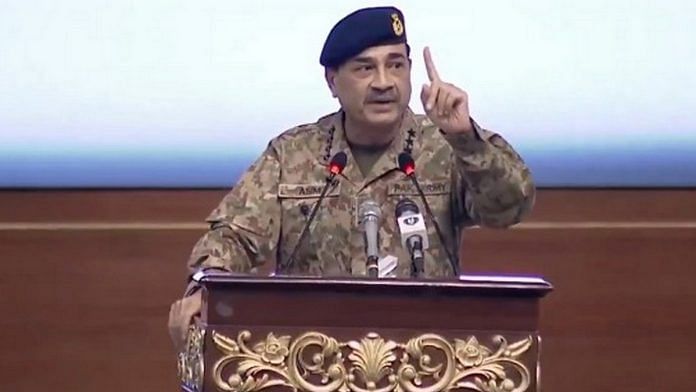Gen Munir attended a Rawalpindi seminary, possibly making him the first COAS to be madrasa educated. The number of firsts continued to grow as he progressed professionally, but all that after he got a commission from the Officers Training School (OTS) at Mangala in 1986, while Gen Zia ul Haq was still leading the country. He has won the coveted Sword of Honour and is the first COAS to have done so at OTS. Gen Munir was commissioned in 23 Frontier Force Regiment, which he subsequently commanded. During his posting to Saudi Arabia as a Lieutenant Colonel, he the Quran. Which earned him the prefix of Hafiz. He is the first Pakistan Army Chief to have managed that achievement.
It was clearly a sign of things to come, particularly for a higher-born Syed whose family was uprooted from Jalandhar in 1947. He served in Pakistan’s Siachen Brigade as a Lt Col. He eventually worked his way up to GOC Force Command Northern Areas, deployed against India across Siachen and Kargil as well. The sight of India dominating the heights in Siachen and the Kargil sector Line of Control must have brutally revived those refugee memories from Jalandhar.
Gen Munir moved down from the heights to occupy the office of Director General Military Intelligence and then Director General Inter-Services Intelligence. He is the first COAS to have occupied both appointments. Certainly, no one else has deeper insight into political, social and other permanent policies as practised by GHQ Rawalpindi. For a Saudi-qualified Hafiz, with a head full of memories, inherited from those who travelled across a hastily carved Punjab border, Gen Munir had the shortest tenure as DG-ISI. He fell out of favour with Imran Khan when he told the PM that his to-be wife had her hand in the till.
Khan’s days as PM were numbered; he was being watched by GHQ Rawalpindi. Dodgy elections and dodgier political manipulation meant that once blue-eyed Khan was out and the coalition Sharif government was in. The coalition gave an extension of service to Gen Asim Munir to make him Chief of Army Staff, and then the Pakistan Army Act to give him a five-year tenure. He’s the first Army Chief to have been legislatively accorded a doubled tenure. He will remain in office till November 2027, giving him plenty of time to see his vision implemented.
Even as he wears military awards bestowed by Bahrain and Turkey, Gen Asim Munir clearly has a regional agenda. An agenda that has been shaped by Pakistan’s politico-military history, and also the sectarian memories carried over the years by its leadership. And none more obvious than General Hafiz Syed Asim Munir Ahmad Shah, Chief of Army Staff, Pakistan. In his case, these memories, accumulated over centuries as the waters of Sutlej and Beas seasonally tore into valuable arable land, even as migrants from Afghanistan continued to flow into the Doaba, occupying dwindling agricultural lands. And all the while, Hindus and Sikhs seemed to grow bolder, in a distinctly Muslim pluralistic district of Jalandhar, from where such memories of resentment travelled into newly born Pakistan, stopping first in Toba Tek Singh and then settling in Rawalpindi.
Gen Munir was born in 1968 in Rawalpindi, when the state and the army remained oblivious to the alarming downturn of events in East Pakistan. Pakistan was preening, given the perceived stalemate of the 1965 war with India, its romance with Washington once again on the upswing as the US wooed China. Syed Sarwar Munir, a principal of a technical school, saw his son Asim arrive in an uprooted Punjabi-speaking household, which, fueled by memory, easily found identifiable enemies to the east and west, Afghan, Hindu and Sikh.
Jalandhar has given Pakistan another Chief of Army Staff, Gen Zia ul-Haq, the progenitor of politico-military jihad across both the Afghan and Indian borders. And like his fellow Doabi successor two generations later, Gen Zia also had a devout mosque going father.
Gen Zia was born in Jalandhar and opted for the Pakistan Army after the Partition of India, whereas Gen Munir carries his origins only in memory form, not on his birth certificate.
But the power of these memories are so intense that Gen Munir doesn’t hesitate while Pakistani university students, “When it comes to the safety and security of every single Pakistani, the whole of Afghanistan can be damned.” Afghanistan was the only country that opposed Pakistan’s admission to the United Nations after independence, he said, adding that the problem is that “our people do not read history”.
History, as Gen Munir’s example shows, creates its own vault of memories. He has repeatedly enunciated the storehouse of his inherited memories, sparing none, in the east or west.
In the same carefully orchestrated interaction with students from public and private universities in Pakistan, Gen Munir revisited the idea of Pakistan based on the two-nation theory. Reminding them, “If we want to adopt Western civilisation, then why did we get rid of Hindu civilisation?” he.
These statements providing a clear insight into his frame of mind were made in public platforms more than a year before he said those gratin, oft-repeated, which preceded the ghastly Pahalgam attack of 22 April 2025.
With half his tenure still to come, much can be expected from Gen Munir. Unlike some of his predecessors who rejected warlike words and even invited Indian journalists to Pakistan military formations, Gen Munir has been hawkish on the neighbourhood, and brutally about the calibre of politicians.
Given Pakistan’s political processes and precedents, anything is possible between the government that selected him as Army Chief and his ambitions. For now, Gen Munir remains unfazed as he chases down his memories. He’s clearly carrying plenty of baggage, so the ceasefire may well be a pause, unless enforced politically.
(Edited by Theres Sudeep)








